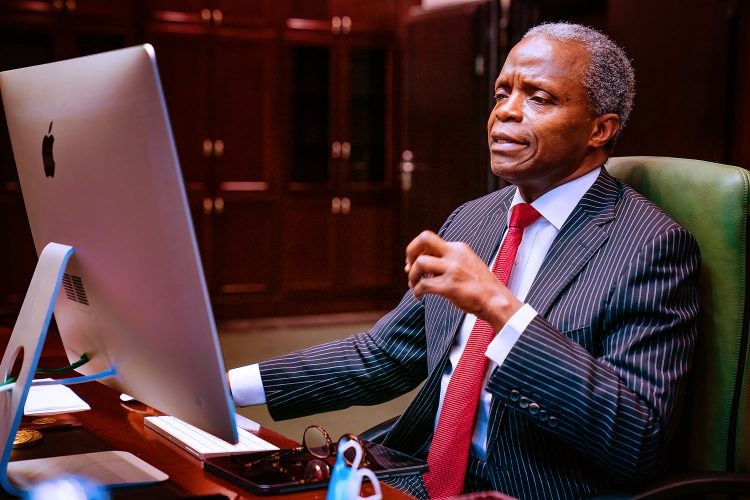How FG delegation to Silicon Valley benefited Nigerian Startups – Osinbajo
Vice President Yemi Osinbajo has outlined how his trip to Silicon Valley in the United States has benefitted Nigerian start-ups, some of whom have gotten funds to grow their business.
Osinbajo disclosed this milestone when he spoke on the Fire Side Chat with Nick Clegg, Facebook VP of Policy and Communication, a former Deputy Prime Minister of the United Kingdom.
He explained that there have been active partnerships between Nigerian start-ups and some US tech firms, assuring Nigerians that more investment is expected to pour in.
“Both tours were extremely successful. At the Silicon Valley, Nigerian start-ups got a chance to pitch their products to tech sector investors, that was very good, in fact before we left Silicon Valley, one of our venture platforms was able to sign a deal of about $10m with the Nigerian US Council, even before we left,” he said.
“Since then we have seen tremendous activities post-trip. We were also at the Facebook campus, which was an absolute delight, we enjoyed being around there, seeing the excitement and a great deal of energy that was encouraging for many start ups seeing at close quarters what a comparable giant was doing, and I think this was very helpful,” he added.
He explained that the entertainment sector has also benefitted from his trip to Hollywood. “Asides from that, we think that the visit helped in showing our seriousness of the tech sector and through the entertainment industry also, we did quite a few meetings also with the entertainment industry.”
“In fact, as of 2018/2019, we had gotten about $377million in investments in the tech sector. This is excellent even though it is still scratching the surface if one considers the size of our economy and the size of the country, but there were very significant gains and I am very happy to have been able to do it.
“Of course, two visits or one visit doesn’t ever answer the various challenges, but I think we started the interactions that have been very useful and we will continue to engage,” he said.
Speaking on how government will fix the challenges and manage the peculiarities of Nigeria’s tech and creative industry, he said, “With regulation, we are dealing with uncharted territory, because quite a few of what we are seeing are entirely new, and I must say that the regulatory authorities have done quite a decent work, trying to grapple with some of the newness of the things that they are seeing.
“For example, we worked on the payment services licenses, these are licenses for fintech companies that are doing some kind of banking type jobs but are not deposit banks, we had to create some room for them, and what has happened is that a collaborative effort of government, and the tech and entertainment sector worked on this and set up a technology and creativity advisory group, and these are young innovators, entrepreneurs etc. who worked with us on the industrial and competitiveness council to craft some of these regulations and to think through some of these problems.
“Those licenses were particularly important because it carved out space that was previously dominated entirely by deposit money banks. Of course you know that they are the least willing to have their lunch taken away from them.
“There have been other ways that the government is trying to fix the issues such as access to credit, which we have worked very hard to ensure that there is some access to credit for innovators, we’ve spoken a bit about foreign investments in Nigeria, but more importantly, what the Bank of Industry is doing is creating a tech fund, the CBN has also established a technology fund and we are working with the AfDB which has a $500m fund which we are at the final stage of trying to bring that into existence.
“So there is quite a bit going on in order to ensure that there is access to funding while we are improving the environment for business as well as the environment for tech companies to operate. I think that one thing that is certain is the change in the technology space which is so rapid that you know, regulators are practically chasing after the innovation, to see how best to regulate without stifling these companies.”
Speaking on the amended National Broadcasting Commission code, he said, “The NBC code you mentioned is one where there is activity around and we are trying to take a second look at it, there are those who say it is anti-competitive and there are those who claim that it is pro competition.
“It is one which I think we should take a second look at. Basically what it says is that if you have a licensed product, for TV or film, you are expected to share it with other platforms.”
“I understand the argument of those who say it is a violation of copyrights and intellectual properties in other ways which is a very strong point and which is why I think it deserves to be given a second look and see where there are ways of moderating that to be more acceptable, so as not to stifle the works of very hardworking creative people who are creating content in film, music etc.”


